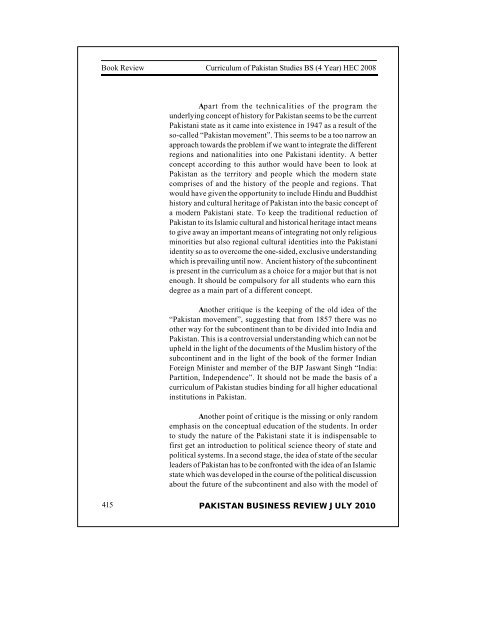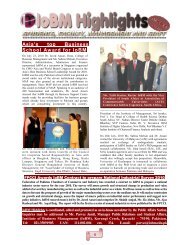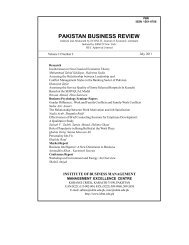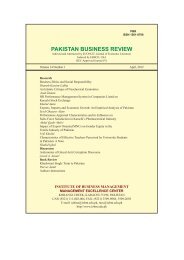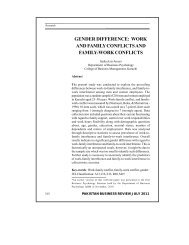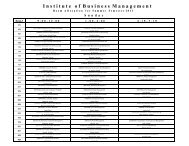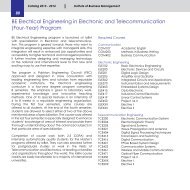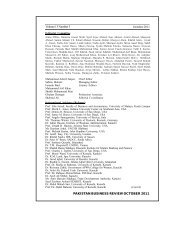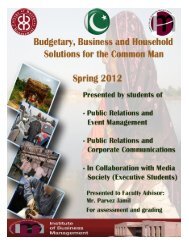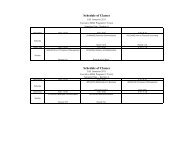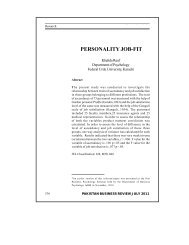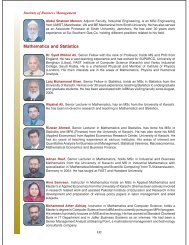Complete Volume - Institute of Business Management
Complete Volume - Institute of Business Management
Complete Volume - Institute of Business Management
You also want an ePaper? Increase the reach of your titles
YUMPU automatically turns print PDFs into web optimized ePapers that Google loves.
Book Review<br />
Curriculum <strong>of</strong> Pakistan Studies BS (4 Year) HEC 2008<br />
Apart from the technicalities <strong>of</strong> the program the<br />
underlying concept <strong>of</strong> history for Pakistan seems to be the current<br />
Pakistani state as it came into existence in 1947 as a result <strong>of</strong> the<br />
so-called “Pakistan movement”. This seems to be a too narrow an<br />
approach towards the problem if we want to integrate the different<br />
regions and nationalities into one Pakistani identity. A better<br />
concept according to this author would have been to look at<br />
Pakistan as the territory and people which the modern state<br />
comprises <strong>of</strong> and the history <strong>of</strong> the people and regions. That<br />
would have given the opportunity to include Hindu and Buddhist<br />
history and cultural heritage <strong>of</strong> Pakistan into the basic concept <strong>of</strong><br />
a modern Pakistani state. To keep the traditional reduction <strong>of</strong><br />
Pakistan to its Islamic cultural and historical heritage intact means<br />
to give away an important means <strong>of</strong> integrating not only religious<br />
minorities but also regional cultural identities into the Pakistani<br />
identity so as to overcome the one-sided, exclusive understanding<br />
which is prevailing until now. Ancient history <strong>of</strong> the subcontinent<br />
is present in the curriculum as a choice for a major but that is not<br />
enough. It should be compulsory for all students who earn this<br />
degree as a main part <strong>of</strong> a different concept.<br />
Another critique is the keeping <strong>of</strong> the old idea <strong>of</strong> the<br />
“Pakistan movement”, suggesting that from 1857 there was no<br />
other way for the subcontinent than to be divided into India and<br />
Pakistan. This is a controversial understanding which can not be<br />
upheld in the light <strong>of</strong> the documents <strong>of</strong> the Muslim history <strong>of</strong> the<br />
subcontinent and in the light <strong>of</strong> the book <strong>of</strong> the former Indian<br />
Foreign Minister and member <strong>of</strong> the BJP Jaswant Singh “India:<br />
Partition, Independence”. It should not be made the basis <strong>of</strong> a<br />
curriculum <strong>of</strong> Pakistan studies binding for all higher educational<br />
institutions in Pakistan.<br />
Another point <strong>of</strong> critique is the missing or only random<br />
emphasis on the conceptual education <strong>of</strong> the students. In order<br />
to study the nature <strong>of</strong> the Pakistani state it is indispensable to<br />
first get an introduction to political science theory <strong>of</strong> state and<br />
political systems. In a second stage, the idea <strong>of</strong> state <strong>of</strong> the secular<br />
leaders <strong>of</strong> Pakistan has to be confronted with the idea <strong>of</strong> an Islamic<br />
state which was developed in the course <strong>of</strong> the political discussion<br />
about the future <strong>of</strong> the subcontinent and also with the model <strong>of</strong><br />
415<br />
PAKISTAN BUSINESS REVIEW JULY 2010


